In international relations, the liberal international order (LIO), also known as the rules-based international order (RBIO), or the rules-based order (RBO), describes a set of global, rule-based, structured relationships based on political liberalism, economic liberalism and liberal internationalism since the late 1940s. More specifically, it entails international cooperation through multilateral institutions and is constituted by human equality, open markets, security cooperation, promotion of liberal democracy, and monetary cooperation. The order was established in the aftermath of World War II, led in large part by the United States.
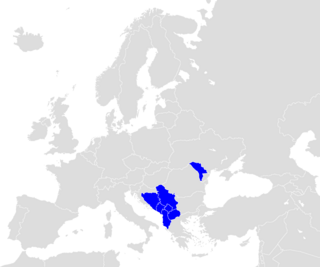
The Central European Free Trade Agreement (CEFTA) is an international trade agreement between countries mostly located in Southeastern Europe. Founded by representatives of Poland, Hungary and Czechoslovakia, CEFTA in 2006 expanded to Albania, Bosnia and Herzegovina, Bulgaria, Croatia, Moldova, Montenegro, North Macedonia, Romania, Serbia, Slovenia and the UNMIK.
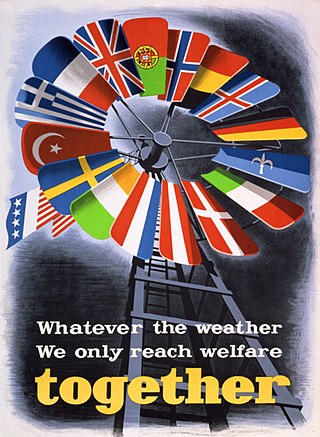
Atlanticism, also known as Transatlanticism, is the ideology which advocates ever closer alliance between nations in Northern America and in Europe on political, economic, and defense issues. The purpose is to maintain or increase the security and prosperity of the participating countries and protect liberal democracy and the progressive values of an open society that unite them under multiculturalism. The term derives from the North Atlantic Ocean, which is bordered by North America and Europe.
Democratic capitalism, also referred to as market democracy, is a political and economic system. It integrates resource allocation by marginal productivity, with policies of resource allocation by social entitlement. The policies which characterise the system are enacted by democratic governments.
European integration is the process of industrial, economic, political, legal, social, and cultural integration of states wholly or partially in Europe or nearby. European integration has primarily come about through the European Union and its policies.
The Westminster Foundation for Democracy (WFD) is a United Kingdom non-departmental public body set up to support democratic institutions overseas. It was established on 26 February 1992 and registered as a company limited by guarantee in the UK. It receives funding from the Foreign and Commonwealth Office (FCO) and the Department for International Development (DFID), which were merged into the Foreign, Commonwealth, and Development Office (FCDO) in September 2020.
A supranational union is a type of international organization that is empowered to directly exercise some of the powers and functions otherwise reserved to states. A supranational organization involves a greater transfer of or limitation of state sovereignty than other kinds of international organizations.
The Stability Pact for Southeastern Europe was an institution aimed at strengthening peace, democracy, human rights and economy in the countries of South Eastern Europe from 1999 to 2008. It was replaced by the Regional Cooperation Council (RCC) in February 2008. The RCC replaced it because it is more "regionally owned" than the Stability Pact, which was driven more by outside partners such as the EU.

Transatlantic relations refer to the historic, cultural, political, economic and social relations between countries on both side of the Atlantic Ocean. Sometimes it specifically means relationships between the Anglophone North American countries, and particular European countries or organizations, although other meanings are possible.

The German Marshall Fund of the United States (GMF) is a non-partisan American public policy think tank that seeks to promote cooperation and understanding between North America and the European Union.
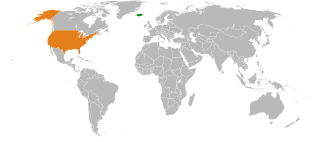
The United States has maintained diplomatic relations with Iceland since the mid-1800s.
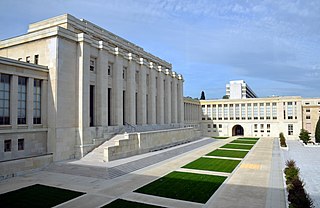
An international organization, also known as an intergovernmental organization or an international institution, is an organization that is established by a treaty, or is an instrument governed by international law and possessing its own legal personality, such as the United Nations, the World Health Organization, Save the Children International, International Union for Conservation of Nature, and NATO. International organizations are composed of primarily member states, but may also include other entities, such as other international organizations, firms, and nongovernmental organizations. Additionally, entities may hold observer status. An alternative definition is that an international organization is a stable set of norms and rules meant to govern the behavior of states and other actors in the international system.

The Ministry of Foreign Affairs of the Republic of Lithuania is a governmental body of the Republic of Lithuania that shapes the national policy, and organises, coordinates, and controls its enforcement in the following areas: foreign affairs and security policy: international relations, economic security, foreign trade, protection of the rights and interests of the Republic of Lithuania and its persons and entities abroad; coordination of European Union membership; representing the Republic of Lithuania abroad diplomatic and consular relations, diplomatic service, Lithuanian national and diplomatic protocol, international relations; the policy of cooperation of the Republic of Lithuania; strengthening of expat connections with Lithuania.
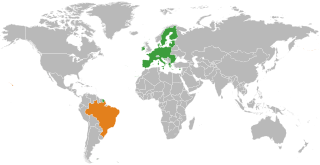
Brazil and the European Union established diplomatic relations in 1960. The European Union and Brazil have close historical, cultural, economic and political ties. At the 1st EU-Brazil summit, in 2007, Brazil entered in a strategic partnership with the European Union, strengthening their ties. This new relationship places Brazil high on the EU's political map.

Argentina has strong cultural and historical links to the European Union (EU) and the EU is Argentina's biggest investor.
The United States Mission to the European Union (USEU) is the diplomatic mission of the United States to the European Union; it is based in Brussels, Belgium. The US has maintained diplomatic relations with the EU and its predecessors since 1953. The first predecessor of the current mission was the US diplomatic mission to the European Coal and Steel Community in Luxembourg, which opened in 1956. In 1961, the US Mission to the European Communities was established in Brussels, which later became the United States Mission to the European Union, upon the latter's establishment in 1993.
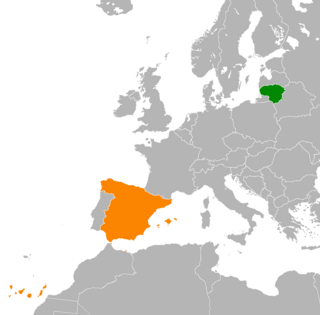
Lithuania–Spain relations are the bilateral and diplomatic relations between these two countries. Relationships are mainly defined by the membership of both countries to the European Union and to NATO. Lithuania has an embassy in Madrid and honorary consulates in La Coruña, Albacete, almería, Barcelona, Bilbao, santa Cruz de Tenerife, Valencia. Spain have an embassy in Vilnius since December 2013.

The Association Trio, also known as the Associated Trio, is a tripartite format for the enhanced cooperation, coordination, and dialogue between the Ministries of Foreign Affairs of Georgia, Moldova and Ukraine with the European Union on issues of common interest related to European integration, enhancing cooperation within the framework of the Eastern Partnership, and committing to the prospect of joining the European Union.










